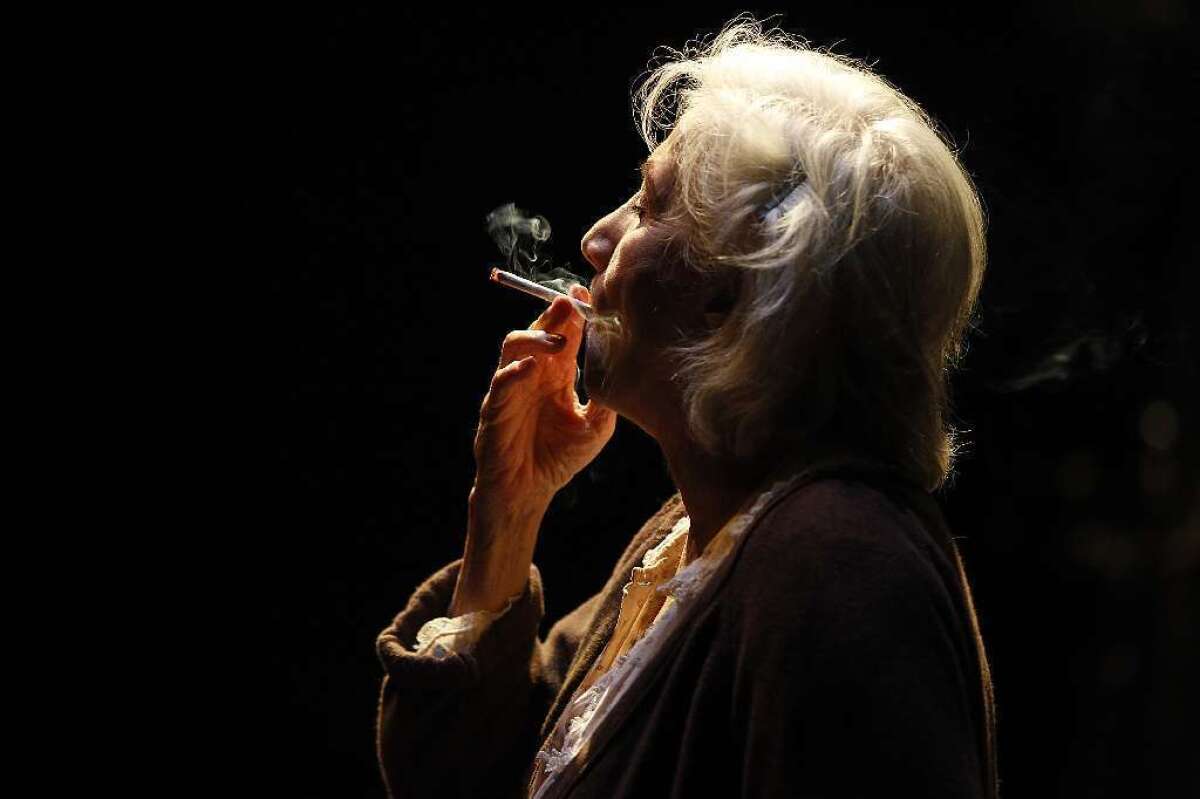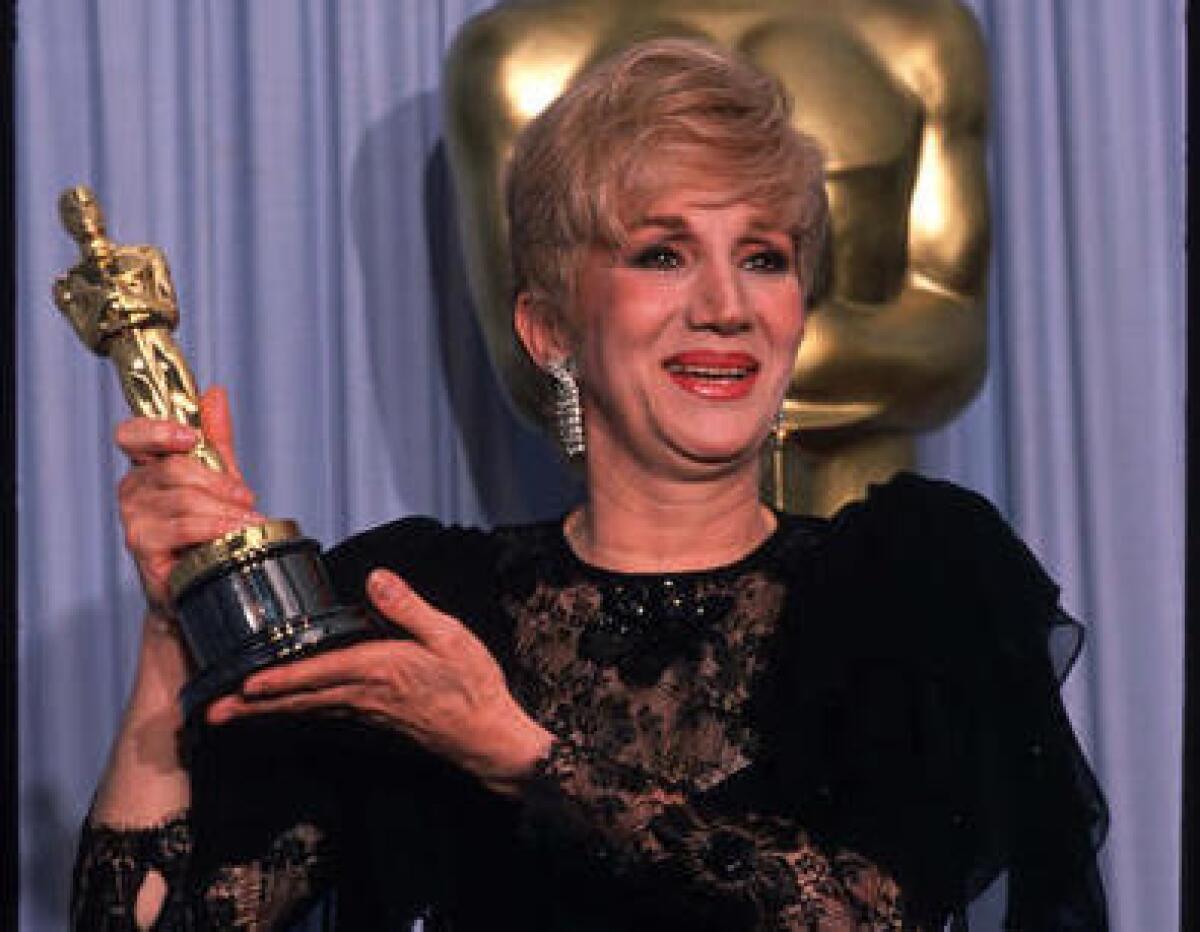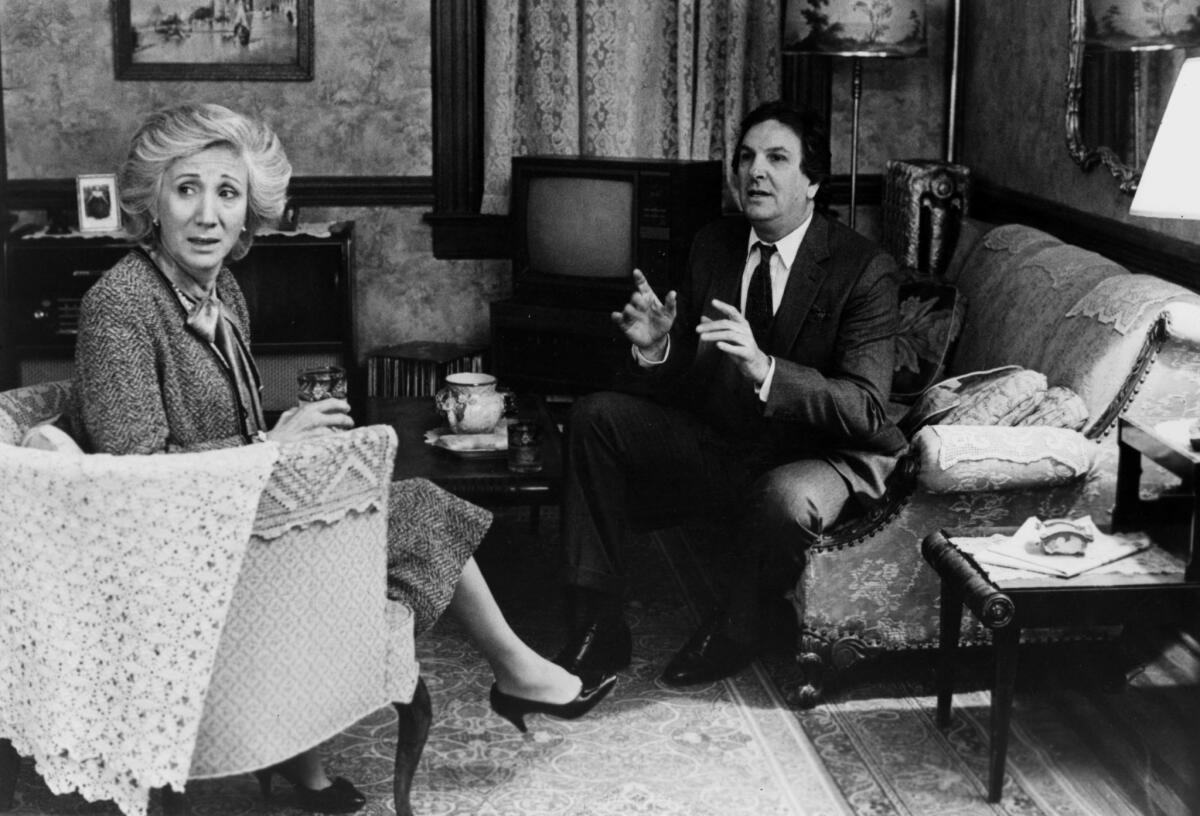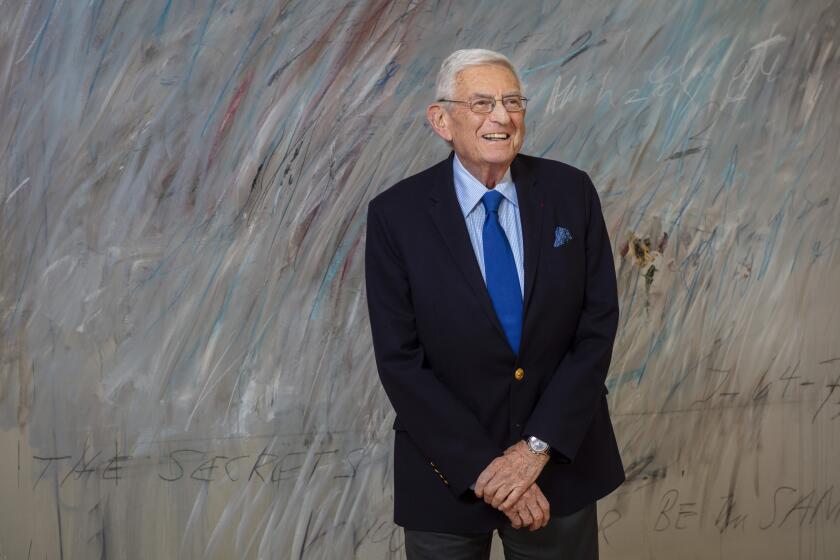Olympia Dukakis, theater veteran and Oscar-winning ‘Moonstruck’ actress, dies at 89

- Share via
Oscar winner Olympia Dukakis, the theater veteran who rose to prominence late in her career with memorable turns in 1980s films such as “Moonstruck” and “Steel Magnolias,” has died at the age of 89.
Dukakis, who also starred in “Look Who’s Talking” and “Mr. Holland’s Opus,” died at her home in New York City.
“My beloved sister, Olympia Dukakis, passed away this morning in New York City,” wrote her brother Apollo, who confirmed her death on his Facebook page Saturday. “After many months of failing health she is finally at peace and with her [husband] Louis [Zorich].” The cause of death has yet to be determined.
The longtime stage actress showcased her talent on a broader stage in 1987 as Cher’s sardonic mother in Norman Jewison’s romantic classic “Moonstruck.” She was 56 when she played meddlesome Italian matriarch Rose Castorini, whose involvement in her widowed daughter’s love life and wry concerns about her own straying husband earned Dukakis an Academy Award for supporting actress, a Golden Globe and a BAFTA nomination.
The self-made billionaire, philanthropist and art collector used his wealth to mold Los Angeles’ cultural landscape.
“The fun part is that people pass me on the street and yell lines from my movies: For ‘Moonstruck’ they say, ‘Your life is going down the toilet.’ Or from ‘Dad,’ they say, ‘How much are those pork chops?’ They say, ‘Do you know who you are?’ It’s real funny,” she told The Times in 1991.
Incidentally, her iconic toilet line hadn’t been in the script, but was improvised based on experiences with her own mother.

Dukakis became a household name in 1988 by way of her Academy Award and her cousin, former Massachusetts Gov. Michael Dukakis, winning the Democratic nomination in the 1988 presidential election. During her Oscars acceptance speech, she stumped for him, concluding her remarks by spontaneously shouting “OK, Michael, let’s go!” as she lifted her Oscar statuette in the air like a baton.
“I felt as though I had run the first leg of a very important race and it was time to hand off that baton to Michael so that he could run the second leg,” she wrote in her 2003 autobiography, “Ask Me Again Tomorrow: A Life in Progress.”
Her cousin lost the election to George H.W. Bush, but the Dukakis cousins remained politically active. The actress, who had been “clipping coupons and shopping for bargain jeans, while working 10- to 12-hour days at the theater” before her Oscar nomination, was a lifelong arts patron and liberal activist who advocated for numerous causes, particularly women’s rights and the environment.
It was her philanthropy and heritage that enabled her name to appear on the Hollywood Walk of Fame in 2013. The Greek America Foundation, which she long supported, came up with the $30,000 required for the application. Additionally, she was approached to play the matriarch in Nia Vardalos’ 2002 runaway hit “My Big Fat Greek Wedding,” but declined due to a scheduling conflict, she told the Chicago Tribune in 2003. She added that she “wasn’t that enthusiastic about the part.”
“I’m happy it’s had success. I know some Greeks feel conflicted about it. I didn’t grow up with those kind of people.” she said. “That wasn’t my Greek experience.”
Born in Lowell, Mass., on June 20, 1931, Dukakis was the daughter of immigrants from southern Greece. She and her brother, Apollo, grew up first-generation Greek Americans in New England, which shaped much of her worldview. Assimilating to American culture, she said, was a lifelong process.
A self-proclaimed “poster child for the bad Greek daughter,” Dukakis said she was encouraged “to strive to be authentic” and to become an American without betraying her Greek heritage. The stage gave her a safe arena to do just that.
“It was a place with firm enough boundaries that I could take emotional and psychological risks there. It was also a place where I could be physical, sexual, and spontaneous. It was the place where I felt the most alive,” she wrote.
Dukakis graduated from Boston University, where she earned a degree in physical therapy and a master’s in performing arts. She dreamed of having her own theater company (she would eventually have two) and touring Europe, performing the classics.
“I did not become an actor in order to become famous or rich. I became an actor so I could play the great parts,” she said.
She arrived in New York in late 1959 but could only find parts playing ethnic roles, of which there were few.
“It would have been a hell of a lot easier to get acting jobs if my name were Day instead of Dukakis, but then I wouldn’t have had the satisfaction of seeing the family name — my parents’ name — displayed so visibly during that time,” she said.
Realizing that to get what she wanted, she would have to make things happen for herself, she turned to Broadway, where she made her debut in “The Aspern Papers” in 1962. That same year, she married actor-producer Louis Zorich, who rose to fame on the television show “Mad About You.” They have three children.
In 1963, she won an Obie Award for “A Man’s a Man” and a second two years later in “The Marriage of Bette and Boo.”
But it was her work the following year in the Broadway comedy “Social Security,” playing Marlo Thomas’ mother, that caught Jewison’s eye. She said she took the role in “Moonstruck” largely for the money but regarded it as one of her lesser works.
“All of the attention I was getting was lovely, of course, but I was more than a little confused about why it had come at this point, and with this role, which, to my mind, was not the greatest part I had ever played,” she said.
But with the success of “Moonstruck” and her cousin’s presidential run, the first-generation Greek American ultimately embraced the laurels and said it allowed her to stop living her life as “a hyphenated American.” The success, she said, allowed them to break through the barrier of ethnic discrimination, which had been “at times, vicious, unforgiving, and isolating.”
Soon the parts she was offered were much more substantive and the pay got “a lot better,” she told The Times. Indeed, with Oscar gold to her name, her agent told her she would get a higher salary on “Look Who’s Talking.” After that, she settled into a Louisiana salon alongside fellow celebrated actresses Shirley MacLaine, Julia Roberts, Sally Field, Dolly Parton and Daryl Hannah in Herbert Ross’ classic 1989 film adaptation of “Steel Magnolias.” Dukakis played the gossip-loving Clairee Belcher, whose memorable zingers included: “If you can’t say anything nice about anybody, come sit by me.”
However, the newly minted film star still devoted much of her time and resources to the theater, working on and offstage for more than 40 years.
“As an actress, I’ve made choices that led me directly away from the fame and fortune acting is supposed to bring,” she wrote.

She and Zorich founded the Charles Playhouse in Boston and the Whole Theater in Montclair, N.J., in the 1970s. They appeared together in several productions and Dukakis worked tirelessly as an actress and producer trying to keep the lights on.
“I wanted the opportunity to play parts I wouldn’t get the chance to play, to use what I felt I understood about theater, to take responsibility and not always wait for ‘the grown-ups’ to decide,” she told The Times.
But the theater business was unsustainable and they shut it down in 1990 due to financial problems.
She also taught drama at New York University and occasionally worked with her former students. “There’s such a thing as payback in this business,” she told Canada’s Globe and Mail in 2013. “People have stepped out for me. If I find somebody that has talent, I step out for him.”
That maternal quality carried over in her film and television careers. Dukakis was frequently cast in motherly roles that called for wisdom and strength — portraying Kirstie Alley’s overbearing mom in “Look Who’s Talking” and “Look Who’s Talking, Too” and Ted Danson’s smothering septuagenarian mother in “Dad.”
Her television credits include the transgender drama “Tales of the City” (1993) and its sequel, which earned her an Emmy nomination. Locally, she appeared in “Vigil,” Morris Panych’s 1995 dark comedy, in 2011. She uttered but 12 lines during her nearly two hours onstage as an elderly recluse visited by a loquacious loser.
Her latest acting credits include “Away From Her” (2006), “In the Land of Women” (2007), “Bored to Death” (2009), “Forgive Me,” (2013), and three projects with filmmaker Thom Fitzgerald, including the series “Sex and Violence” and the one-woman play “Rose,” in which she portrayed an 80-year-old Ukrainian Jew looking back on her life.
“I love transforming,” Dukakis told the Globe and Mail. “It’s the fun part of acting. It’s the easy part, actually. But it’s getting harder and harder for actors to do. You have to have a look, it has to be current, the body has to look this way. This is the enemy of transformation.”
Entertainment video playlist
Follow me: @NardineSaad
More to Read
Start your day right
Sign up for Essential California for the L.A. Times biggest news, features and recommendations in your inbox six days a week.
You may occasionally receive promotional content from the Los Angeles Times.








